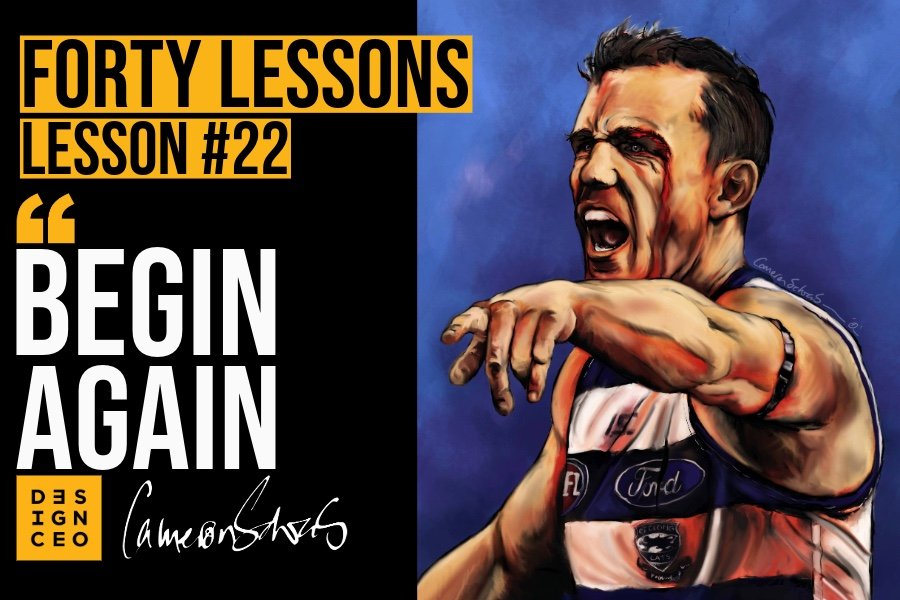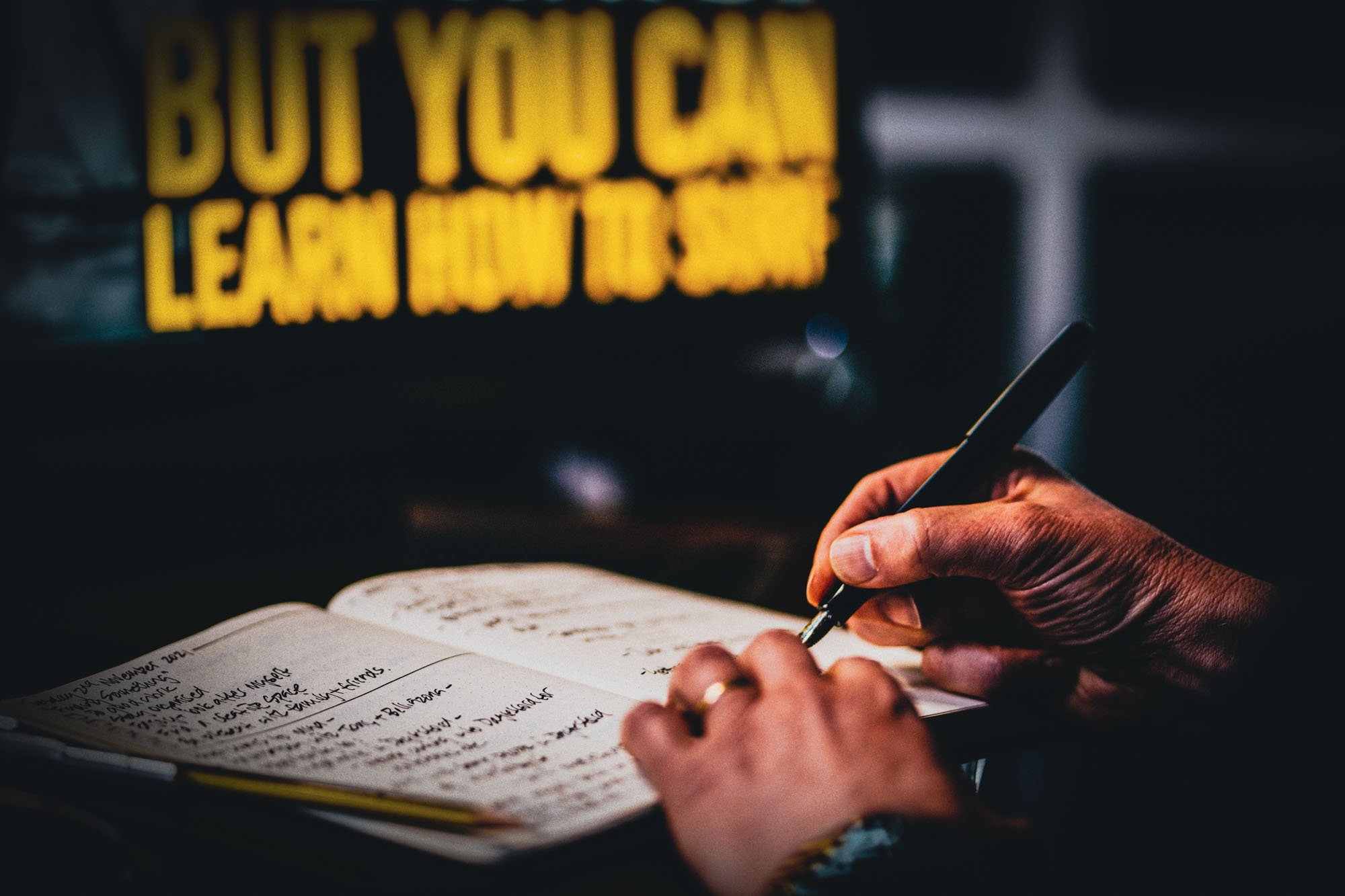Lesson #22 - Begin Again
People in sport are naturally visual, unsurprisingly.
Premiership victories can be traced to a napkin from a local cafe, an effort to record a ‘strategy session’ where every utensil, glass, coffee cup and condiment on the table has been shifted to create a ‘team structure’ that will be hard to defend against.
What started as an informal conversation amongst the thoroughly obsessed soon became much more. Curiosity and courage, the two characteristics that differentiate people in elite team sport, for without them, whatever small success you enjoy today won’t be around for you to bask in tomorrow.
Leaders in elite team sport need to balance present and future, winning the next game (staying present) whilst planting the seeds (being a good ancestor), and this creates enormous equivocation, ambiguity and often conflict, the conditions that the better clubs thrive in, and what separates the successful leaders in those organisations, and it often marginal.
A key lesson I learned the hard way is that no matter how good your culture and strategy seem at any time, all solutions are temporary.
Sport and business have many crossovers, and one of those is the likely competitive response to whatever plan, strategy or idea gives us some form of advantage, the move/counter-move continuum.
Having already climbed a mountain, it represents the start of a new climb.
The need to ‘begin again’.
The capacity to ‘begin again’ is such an overwhelming thought.
In football, it is easier because we have seasons: one finishes, another starts, and there are the smallest windows for reflection, reaction and action.
Even for the Premier, their time in the sun will be short. The upcoming Trade Week will soon dominate media coverage, almost before the premiership heroes have removed their ankle strapping.
This is the game’s truth. For all of its bluster, the football season itself represents the diminution of hope. Reality kicks in as each week plays out, and the number of teams who can contend and feature reduces. By the time the Grand Final is played and won, we are down to one team.
Trade Week represents the renewal of hope for everyone else, no matter how difficult the previous season had been, and the promise of the future is a potent elixir.
An interesting fact in the AFL is that no team that has won a premiership has ever taken the field together again. This will continue in 2024, with Collingwood’s Jack Ginnivan being traded to Hawthorn, just weeks after his final game for the Magpies, a winning Grand Final.
The year before, it was Geelong champion and captain Joel Selwood, who features in my drawing, giving direction, as he did for eleven years and 245 games (an AFL record), who retired after leading the Cats to the 2022 premiership.
A season ending represents a new beginning, and I recommend we all have a version of this.
‘Begin Again’ is the circuit breaker. We cannot change ‘what happened’, but we can take responsibility for what we do about it and give ourselves the best chance to make the most of ‘what now’ and ‘what next’.
A blank page in a notebook for the writer, like a blank canvas for an artist, will always test the curiosity and courage of the protagonist, wonderfully described by the most courageous and curious creative, the Dutch Post-Impressionist artist Vincent van Gogh, in his letter to his brother Theo in 1881 as he was starting his artistic pilgrimage.
“You don’t know how paralysing it is, that stare from a blank canvas that says to the painter you can’t do anything. The canvas has an idiotic stare, and mesmerises some painters so that they turn into idiots themselves. Many painters are afraid of the blank canvas, but the blank canvas is afraid of the truly passionate painter who dares — and who has once broken the spell of ‘you can’t’.”
‘Begin again’, a new journey: another mountain to climb and a new place to plant our flag.
Try to visualise quickly. Picture it, then translate and iterate.
Taking something from its first elementary thought (condiments on a table), its many iterations drawn and re-drawn from mistakes made and learnings gained (the debates, the whiteboards, the training track, the video sessions, the losing and winning of games) to its full realisation (a premiership victory on the MCG in front of 100,000 people) is metaphorically, what leaders do. It changes the way the game is played and how the world thinks.
As leaders, we get to draw the outline of a future, something that inspires, knowing that others will need to colour it in.
Storytelling has a remarkable ability to connect people and inspire them to take action. Leaders must tackle this critical challenge: crafting a story so clear and compelling that it will harness and hold energy.
It will be a story with depth and simplicity that can be told repeatedly without becoming a cliche of itself, and if it does, that’s ok.
The path to doing anything difficult will require dealing with the inevitable roadblocks; the most significant is the capacity to stay clear-headed in the face of uncertainty, conflict and rancour.
I like this quote from legendary NBA coach Phil Jackson, who took the Chicago Bulls and LA Lakers to eleven championships.
“I always welcomed debate, even if it disrupted team harmony temporarily, because it showed that the players were engaged in solving the problems. The big danger was when a critical mass of players jettisoned the principle of selflessness upon which the team was founded. That’s when chaos ensued.”
And always remember, you might well be the problem that needs to be solved.
You need to know, and finding out can be very elusive.
‘No one tells the CEO their baby is ugly” is one of my most uttered truisms.
Again, it is a test of curiosity and courage.
“What stands in the way becomes the way”, or “The obstacle is the way”, said Ryan Halliday, channelling the Stoics.
Finding a path, recognising the opportunities that will emerge from the very same obstacles we are confronting.
From our constraints come our opportunities.
Creativity is using existing constraints to find new solutions, be ok with them, embrace them, and rollick with them. To find a story that inspires, is compelling, that people understand, and can see the possibilities for them and their group, urging them to do the work it is asking of them.
The story begins, builds, and burns bright, and eventually, all stories must burn out, but the legacy is forever. Now, it is a story to be told and retold, with bits added and subtracted, some mayonnaise, and it becomes folklore and legend.
It might be the competitive nature of elite sport and the often desperate need to seek advantage, even for one game (or one quarter), but it is an environment very energised, almost obsessed, by the “What I don’t know?” mindset. Leaders, mostly coaches, are prepared to ‘brood’, think deeply, ask better questions, and invite different perspectives, and go with a ‘hunch’, to experiment and draw inspiration from the new information the effort has gifted them.
The better leaders in the AFL have shaped their teams and clubs such that they have shaped how the game is played and experienced. It hasn’t always been pretty or popular, but it has put silverware, real and metaphoric, in their club’s trophy cabinets and forced other leaders to respond, and the game shaping continues ad infinitum.
These are the people who look at the future of the game and see radically different things from most. They are happy to sit at the frontier of what is known and unknown, seeking to turn the unknown into the known, if only to reveal another unknown. They are more interested in what we can become than who we think we are already.
And we, the lovers of the game, are the beneficiaries, as much as we tried to fight it at the time.
These are brave people. Prepared to hazard themselves for the possibility of fulfilling the promise of the sport.
They also speak openly about how the game has shaped them. How thankful they are for the lessons the game gifted them, always prepared to put themselves in deep and diverse conversation to satisfy their relentless curiosity, being at ease with not-knowing.
Always trying new things, often getting it wrong, comforted by the understanding that, when the healing is done, loss and heartbreak are temporary states and essential for growth.
Prepared to ‘begin again’, their obstacles became the game’s way.
Play on!
Stay Connected
Please subscribe to our “In the Arena” email.
From time to time to time we will email you with some leadership insights, as well as links to cool stuff that we’ve come across.
We will treat your information with respect and not take this privilege for granted.



